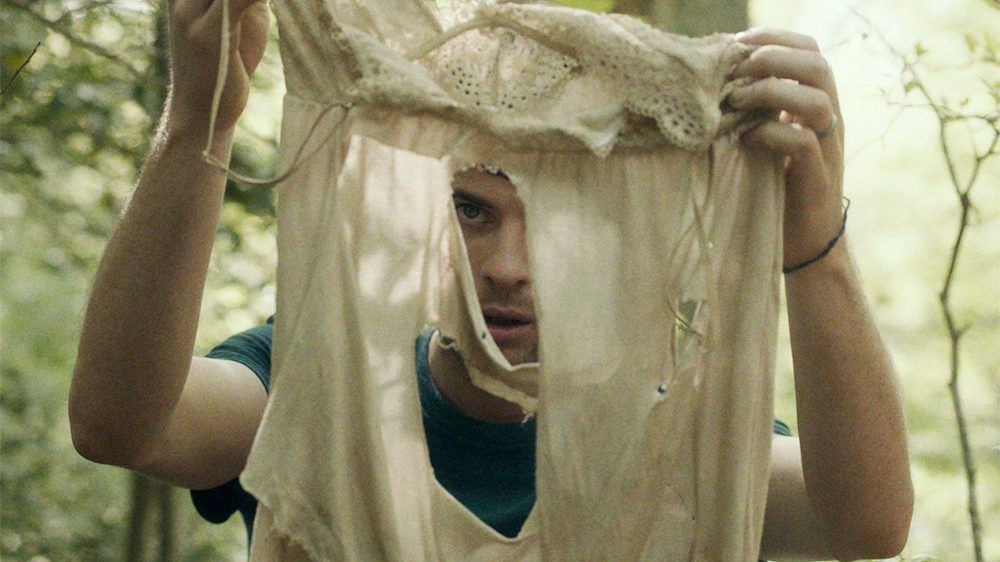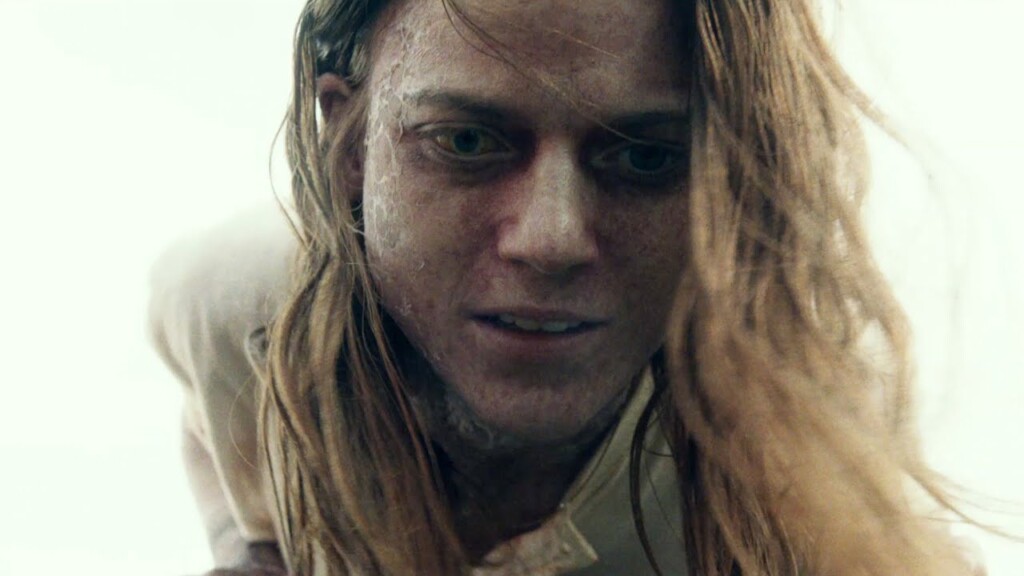“Something bad happened to me in the woods.”
How well do we know each other? Any of us? How well can one human fully understand another, no matter how deep their connection, or how much time they spend together? That’s the central question at the core of Leigh Janiak’s Honeymoon, and while the film doesn’t completely stick the landing, it’s a solid debut. The performances and directing are both well done, and there’s an undercurrent of ambition throughout. If you’re looking for conventional horror, look elsewhere. Things don’t start to get scary until about the halfway point. If you appreciate a slow burn, then Honeymoon will likely be in your wheelhouse.
Honeymoon is a bit of a hermit crab of a film. Is it a domestic drama masquerading as a horror film, or is it the other way around? Is it a subversion of the “cabin in the woods” trope that has been an integral part of horror narrative for decades, or is it just another version of that? At the film’s most successful moments, it seems like it’s both. The film is nicely intimate – only two actors’ names are in the opening credits, and only four actors appear throughout the film; this could ostensibly work as a play. Our main characters are Bea (Rose Leslie) and Paul (Harry Treadaway), who, after what sounds like a fun, unconventional wedding, are off to Bea’s family cottage for the titular getaway. Right away it’s established that there is no internet or cell service, and soon enough we learn that all neighbors are so far away as to be basically nonexistent. It’s a classic – cliched, actually – setup for a horror film, but Janiak isn’t looking to do a small-scale Evil Dead here.
More than even a sense of building dread, Honeymoon tries to cultivate a sense of unease borne of the unknown. What if, Paul starts to wonder, he doesn’t know his wife as well as the thought he did? He’s taken aback to learn that she would use live frogs as fishing bait, and that her father is evidently such a skilled hunter that one room in the cottage is adorned with a massive bear skin. In the film’s first truly unsettling scene, Paul and Bea go to a local restaurant and run into a long-ago ex of Bea’s named Will (Ben Huber), who, puzzlingly, calls her “Trixie.” There are hints throughout the film that Bea lived a different life altogether, but, frustratingly, Janiak doesn’t follow up on many of these threads, and Paul takes things in stride far too easily. He has no follow-up questions about his wife being called by, and answering to, another name.

Rose Leslie gives a game performance as the movie’s emotional and narrative anchor. Stripped of her Scottish accent, she sounds remarkably like Emma Stone, and she believably plays Bea as goofy, capable, and madly in love with Paul. It’s hard to see why, though, when Treadaway is so comparatively bland. Granted, he’s the straight man in the situation, as the transformation here is Bea’s. But it would have been nice if Treadaway brought more desperation and urgency to the role.
Things don’t start to get spooky until about the 45-minute mark, which some viewers will find frustrating or off-putting. Slow burns are hard to pull off, but Honeymoon manages to thread the needle here, injecting just enough uncertainty into Paul and Bea’s relationship that when she goes missing in the middle of the night, it comes about naturally. Paul finds her in the woods, nude, unresponsive. She screams when he touches her. It’s all downhill from here.
The pleasant surprise – well, maybe not the best word choice – in Honeymoon is how it eschews the normal tropes of possession films. Bea is not being possessed, she’s being erased, and that’s far sadder. Some of the film’s most upsetting scenes succeed because Leslie plays Bea not as a horror-movie heroine, but as a a woman struck with Alzheimer’s. She makes French toast but doesn’t batter the bread; she makes coffee but doesn’t grind the beans. When she goes to take a nap, she says she’s going to “take a sleep”; looking for the word “suitcase,” she lands on “clothes box.” Paul hardly picks up on this, though, as he’s convinced that Bea’s torn nightgown and the bite marks on her thighs are proof that she had a tryst in the woods with Will.
The subplot involving Will and his wife, Annie (Hanna Brown) is never fully resolved, and one wonders if it was necessary at all. By eliminating it, Honeymoon could have stayed the claustrophobic, locked-room mystery it so clearly wants to be. All we learn is that Will is presumably dead, and Annie has similar bite marks, and pages of paper all reading “My name is Annie.”

There’s a nice sense of recursion in Honeymoon – lights, flickering and shining – and it plays out in the best scene, when Paul asks Bea, “Who are you?” It leads to the best, most heartbreaking exchange in the film:
Bea: Bea. My name is Bea.
Paul: Who am I?
Bea: (after a long pause) My husband is Paul.
Bea is not being possessed, she’s being erased. That’s terrifying on an existential level (side note: if this interests you, check out Joe Hill’s short novel Snapshot, which deals with a similar plot). It’s one thing to understand what horrifying thing is happening to you, it’s another to not have a grasp on the events, but your own humanity as well. Bea says she wants to protect Paul, and in her mania she ties him up and dumps him into the lake, insisting that she’s just hiding him in the water.
Honeymoon effectively boils the story up to its unsettling finale, which is what makes the end so frustrating. Janiak withholds so much from the audience that we’re left feeling unsatisfied. We never get a clear answer on who is erasing Bea, or to what end. We see some shrouded figures who could be aliens or demons or cultists or anything in between. Perhaps that’s the point. If we take Honeymoon as a portrait of a crumbling relationship, then yes, it’s safe to say that sometimes those fall apart for unknown and unforeseen reasons. But if that were the case, Janiak should have showed us even less. The film ends in a kind of limbo state, where we don’t have enough information to piece the story together, and we have too much information to be satisfied in our bewilderment. That being said, Honeymoon is worth watching for Leslie’s performance, and for the sheer ambition that Janiak displays here. Since this, she’s gone on to direct some TV, but here’s hoping that she returns to feature films soon. She clearly has something to say.
10/1: Hellraiser / The Invitation
10/2: Splice / Banshee Chapter
10/3: Jennifer’s Body / Raw
10/4: Dominion: Prequel to The Exorcist / Book of Shadows: Blair Witch 2
10/5: Kill List / A Field in England
10/6: Halloween II / Halloween III: Season of the Witch
10/7: A Nightmare on Elm Street 2: Freddy’s Revenge / A Nightmare on Elm Street 3: Dream Warriors
10/8: Ginger Snaps / Creep
10/9: Cube / Creep 2
10/10: The Texas Chainsaw Massacre (2003) / The Ritual
10/11: Hell House LLC / The Taking of Deborah Logan
10/12: Re-Animator / From Beyond
10/13: Beetlejuice / Sleepy Hollow
10/14: Idle Hands / The Lords of Salem
10/15: The Ring / Noroi: The Curse
10/16: I Know What You Did Last Summer / The Monster
10/17: Night of the Living Dead / Train to Busan
10/18: The Devil’s Backbone / Southbound
10/19: Event Horizon / Dreamcatcher
10/20: The Cabinet of Dr. Caligari / The Bad Seed
10/21: Eyes Without a Face / Goodnight Mommy
10/22: The Strangers / The Strangers: Prey at Night
10/23: In the Mouth of Madness / The Void
10/24: The Amityville Horror / Honeymoon
10/25: Gerald’s Game / Emelie
10/26: The Monster Squad / Behind the Mask: The Rise of Leslie Vernon
10/27: Veronica / Jacob’s Ladder
10/28: High Tension / You’re Next
10/29: The Innkeepers / Bug
10/30: The People Under the Stairs / Vampires
10/31: Saw / Saw II

